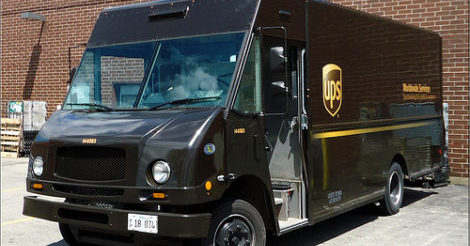
 )
)In light of uncertainty about the US government’s regulatory approach to climate change, I figured we could use some encouragement from the private sector. Over a decade ago, UPS found a way to nearly eliminate left turns from their delivery routes. Recently announced results of this program reveal significant reductions in fuel consumed, carbon dioxide emitted, and dollars spent; they’ve even been able to cut down on total vehicles in service. UPS was not obligated to make this change. They did so because it made economic sense to use fewer fossil fuels. Economic considerations alone may not yield all of the reductions needed to mitigate climate change, but it is heartening to know that at least some reductions will occur regardless of government mandate.
The fuel and financial savings come from eliminating idling time spent waiting for an opportunity to turn across oncoming traffic. Energy released from burning gasoline is a use-it-or-lose-it proposition. If that energy is not used to move the car forward, it is simply dissipated as heat. Hybrid cars can capture some of that energy and store it in their batteries, which is one way that they improve fuel efficiency. But even converting to electric energy and then using that electric energy to move the car is not as efficient as using the energy to drive the car as it is released by combustion. So keeping the trucks rolling as much as possible is the best option.
Given how much UPS saved, imagine if everyone’s GPS software routed them in a way to reduce left turns. Or even better, imagine if autonomous vehicles operating in coordination with each other modulated routing and flow of traffic such that when left turns are necessary, there is an opportunity to turn just as the turning car arrives at the intersection. The first scenario is feasible now, and the second one is probably realizable in our lifetimes. We just need the collective will to realize these visions.
The article about UPS also discusses the tragedy of the commons–the problem of getting individuals to participate in an activity with collective benefit but which does not require nor incentivize any one person’s contribution. Government policy or regulation is one way to encourage participation. But if government is not inclined to intervene, there is nothing theoretically preventing us from collectively choosing to opt in anyway.
This topic makes me wonder about the relative merits of online shopping versus in person shopping. On the one hand, the marginal fuel cost of me personally driving to one or more stores is likely higher than the marginal fuel cost of shipping me the same items, especially if I can combine multiple purchases. On the other hand, there are environmental costs from the extra packing material. And then there are the tradeoffs of having people employed on the margins of a largely automated packing and shipping business versus employed by or running local small businesses. Anyone familiar with a comprehensive treatment of these considerations?
Andy has worn many hats in his life. He knows this is a dreadfully clichéd notion, but since it is also literally true he uses it anyway. Among his current metaphorical hats: husband of one wife, father of two teenagers, reader of science fiction and science fact, enthusiast of contemporary symphonic music, and chief science officer. Previous metaphorical hats include: comp bio postdoc, molecular biology grad student, InterVarsity chapter president (that one came with a literal hat), music store clerk, house painter, and mosquito trapper. Among his more unique literal hats: British bobby, captain’s hats (of varying levels of authenticity) of several specific vessels, a deerstalker from 221B Baker St, and a railroad engineer’s cap. His monthly Science in Review is drawn from his weekly Science Corner posts — Wednesdays, 8am (Eastern) on the Emerging Scholars Network Blog. His book Faith across the Multiverse is available from Hendrickson.

Leave a Reply